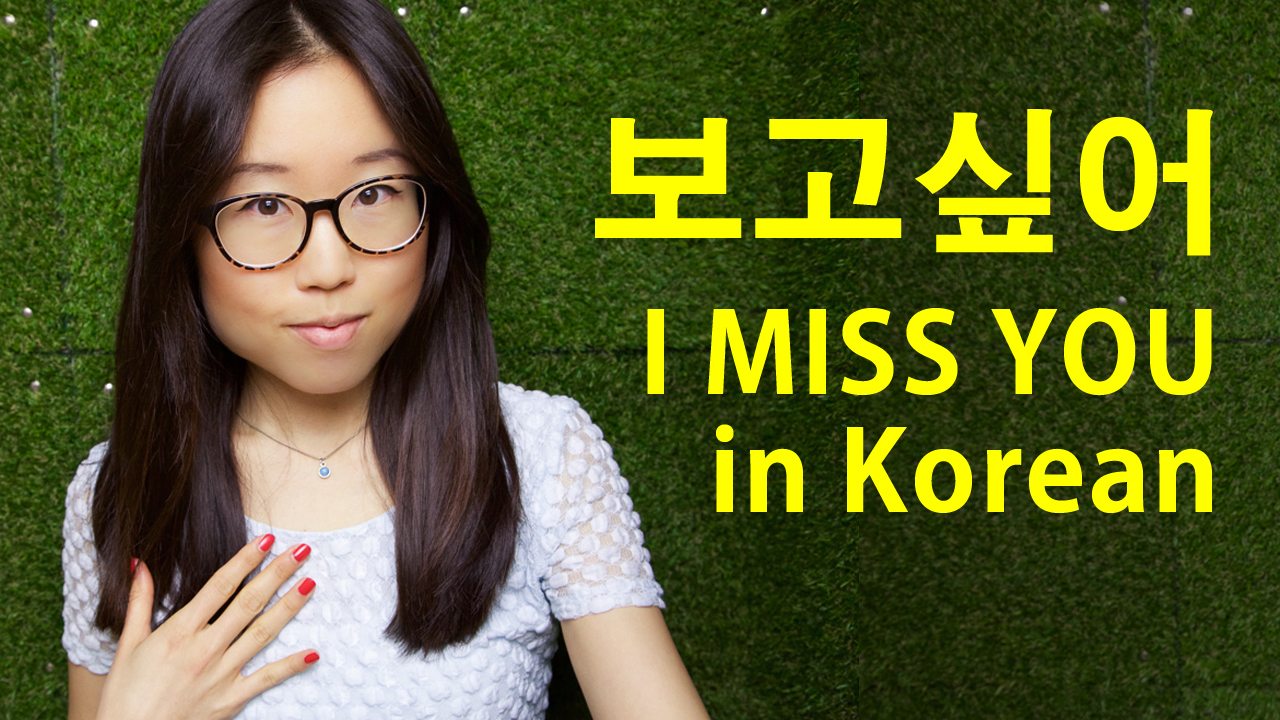"I miss you" in Korean is 보고싶다 (bogoshipda). It can also mean "I want to see."
Another way to say "I miss you" is 보고싶어 (bogoshipuh). This is informal, so use it towards friends, those your age and younger than you, and to your sweetheart, of course. Here are some examples on how to use 보고싶어 (bogoshipuh):
당신, 보고싶어. 나 보고싶어?
Dangshin, bogoshipuh. Na bogoshipuh?
Honey, I miss you. Do you miss me?
(informal)
나도 너 보고싶어.
Nado nuh bogoshipuh.
I miss you, too.
(informal)
얼만큼 보고싶어?
Ulmankeum bogoshipuh?
How much do you miss me?
(informal)
보고싶어 (bogoshipuh) is used in Zion.T's "Eat" music video:
Make 보고싶어 (bogoshipuh) formal by adding 요 (yo) at the end: 보고싶어요 (bogoshipuhyo). Use the formal version towards those older than you. Couples who use formal language to one another will also use this version. Examples:
할머니, 보고싶어요.
Halmoni, bogoshipuhyo.
Grandma, I miss you.
(formal)
할아버지도 보고싶어요.
Harabuhjido bogoshipuhyo.
Grandpa, I miss you, too.
(formal)
가족 다 보고싶어요.
Gajok da bogoshipuhyo.
I miss the whole family.
(formal)
Listen for 보고싶어요 (bogoshipuhyo) in Gummy's "I'm Sorry" music video. It features T.O.P. from Big Bang:
Remember, 보고싶어 (bogoshipuh) also means "I want to see," so it can be applied to non-human things.
너 춤추는거 보고싶어!
Nuh choom-choo-neun-guh bogoshipuh!
I want to see you dance!
(informal)
에펠 탑을 보고싶어.
Ehpel tahpeul bogoshipuh.
I want to see the Eiffel Tower.
(informal)
쌍무지개도 보고싶어!
Ssangmoojigaedo bogoshipuh!
I also want to see a double rainbow!
(informal)
무슨 영화 보고싶어?
Mooseun younghwa bogoshipuh?
Which movie do you want to see?
(informal)
난 "캐리비안의 해적” 보고싶어.
Nan “Kaeribianui haejuck” bogoshipuh.
I want to see “Pirates of the Caribbean.”
(informal)
What if you don’t miss someone or don’t want to see them?
남친 보고싶지 않니?
Namchin bogoshipji ahnni?
Don’t you want to see your boyfriend?
(informal)
보고싶지 않아.
Bogoshipji ahnna.
I don’t want to see him.
(informal)
왜 안 보고싶어?
Wae ahn bogoshipuh?
Why don’t you want to see him?
(informal)
그냥 안 보고싶어.
Geunyang ahn bogoshipuh.
I just don’t want to see him.
(informal)
아, 너희들 싸웠어?
Ah, nuhhuideul ssawussuh?
Ah, did you guys fight?
(informal)
The very formal and rarely used version of I MISS YOU is 보고싶습니다.
The cutesy aegyo way to say “I miss you” is: 보고싶어용 (bogoshipuhyong). 용 (yong) is placed at the end of a phrase to make things sound cutesy. Another aegyo way to say I MISS YOU is 보고파 (bogopa). Which almost sounds like 배고파 (baegopa/I’m hungry.). 보고파 (bogopa) is the title of Kpop songs by BTOB and Tiny-J (see below).
In Tiny-J’s song, they pronounce "bogopah" as "bogofah" with an F to sound super duper cute. I recommend you don’t overuse the cute versions. Every once in a while can be fun. Use it too much and people around you may cringe!
The more poetic way to say “I miss you” is 그리워 (geuriwo). Use this phrase when talking about a non-living thing or memory. 그리워 (geuriwo) is informal. Add 요 (yo) at the end to make it formal. Add a subject in front of this phrase to be specific of what you're missing. Examples:
한국이 그리워요.
Hangookee geuriwoyo.
I miss Korea.
(formal)
캘리포니아가 그리워요.
Kel-lee-po-ni-ah-ga geuriwoyo.
I miss California.
(formal)
대학 시절이 그리워요.
Daehak shijuhlee geuriwoyo.
I miss those college days.
(formal)
Hope you enjoyed this week's Korean lesson. Tune in on my YouTube channel next Wednesday for more educational goodies!
ps: When I hear the word 보고싶다 (bogoshipda), I often think of Kim Bum Soo's famous song. My Korean friends still sing it at karaoke even though the tune was released in 2003. That's well over ten years ago! Classic. Here's the song:






